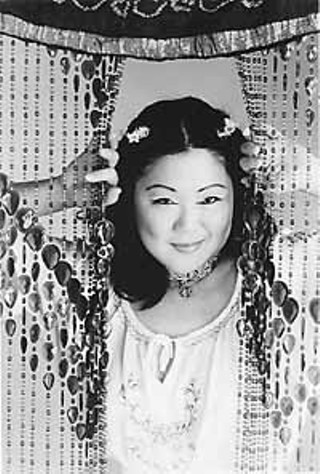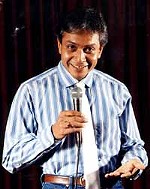To Sitcom Hell and Back
In Surviving a Comic's Dream Come True, Margaret Cho Has Made a Hero's Journey
By J. C. Shakespeare, Fri., Oct. 1, 1999

Renowned classical scholar Joseph Campbell inspired legions of artists with his distillation of the concept of the heroic journey, a metaphor of life in which a hero leaves the comfort and safety of his home, ventures into the underworld of chaos, darkness, and the unknown, and emerges triumphantly with some enlightenment or grace-saving message for his fellow man. The concept has been watered down and rendered formulaic by Hollywood screenwriters, but if one takes the time to contemplate the inner meaning of the concept, one realizes that the heroic journey is really an inward mission to find the true self, slaying dark dragons of the psyche along the way, and the hero emerges with the confidence and power that come from truly finding one's own voice. Margaret Cho is one of the finest comics working today, and her story is a classic example of the hero's journey. Cho began to hone her comedy chops as a teenager, starting out in a comfy little club above her parents' bookstore. She took to comedy instantly and was soon working other clubs. In the early Nineties, Cho became one of the most popular acts amongst college crowds, and she toured the country tirelessly. Gigs on Arsenio Hall's show and a Bob Hope special put her on the national map, and in 1994 she was voted Female Comedian of the Year. To top off her success, Cho became the first Asian-American to star in her own sitcom, All-American Girl.
Apparently, however, network television was not ready for the real Cho. Frantic ABC execs told her she was too fat and actually said things like, "Her face is so round!" The stunned young actress went on a dangerous crash diet, dropped 30 pounds in two weeks, and landed in the hospital. The subsequent cancellation of the show sent Cho into a tailspin of drunken oblivion. While she continued to work clubs and colleges at a hectic pace, her appetite for destruction rivaled that of any self-disrespecting rock star.
In a recent interview by phone, Cho explained what happened to make her see the light and clean up her act. "Basically it was a whole year without seeing a sober moment," she said. "I just realized I couldn't live that way anymore. I just couldn't do it, so I stopped."
"How did you do that?" I asked.
"I have a lot of support, a great support network, but I really just lost my desire --"
"Just woke up one day and said, "That's it.'"
"Mmm-hmmm."
"That's awesome. Has it been hard for you?"
"No," she answered, her voice calm and confident. "The way that I lived was so disgusting, and I felt so sick every day, I just couldn't do it anymore."
Between the quirks of insecurity that accompany the comedic personality, a constant need for attention, and hours of daily leisure time, the lifestyle of the comic can easily lead to excessive partying. "Comedians tend to be pretty excessive -- big appetites for drugs and alcohol," Cho said.
"So I've heard."
"It's a huge part of comedian culture. The lifestyle is perfect for that kind of addictive behavior. Let's say you get up really, really early in the morning and do radio. Then you have all day to veg out. At night, you go do a show and everybody pays attention to you and then you just get messed up. And it's so easy to live that way; I lived that way for years. I was really close to death many times. I thought that the only way I could be successful in life was if I was a successful drug addict and alcoholic and a successful suicide. That's what I felt my life had come to. I was very depressed and very self-destructive and very, very busy. Working the clubs and still performing. It's amazing; I still don't know how we can do that: get up there with all the chemicals and alcohol and still do shows. But I'm a lot better now and much healthier since I left all that behind. It was pretty sick."
"What was your drug of choice?" I asked.
"Everything. I'm a big lover of alcohol and all drugs."
"An equal opportunity offender."
"Exactly."
"So were you getting fucked up before your shows?"
Cho laughed. "Oh yeah, before, after, during -- It was easy, in a way, and sometimes kind of cool. Like when you're doing a Friday night late show and the audience is just as fucked up as you. You get to surreal places."
"That unexpected stuff that comes from chaos?" I asked.
"Yeah. It's like a vision quest."
This notion of the vision quest ties in perfectly with the heroic journey formula; the hero must destroy the false self in order to emerge with a new, more truthful vision. I tried to put this into practical terms: "It seems to me that television almost destroyed you, yet it also forced you to turn inward, to the material that was really you, and so it saved you in a way."
Cho agreed. "Yeah, it really did. I think my audience really saved me. That I could be that fucked up and people would still love what I did, and still laugh, and I felt I really had a responsibility to them, to the people who kept coming back to shows even though I could barely stand up. Sobriety has been great, and I'm really pleased with the way my life is going. I realize that nothing could be possible without [having gone through] what happened to me."
Cho has been clean and sober for over a year and a half now, and that clarity has allowed her to re-evaluate the harrowing experience of trying to please television executives and the general viewing public. All that pain and doubt has been erased through the transformative power of laughter, and the result is Cho's new one-woman show, I'm the One That I Want, which she will be performing in Austin on Saturday night.
The show, which largely chronicles her experience with All-American Girl, has received glowing reviews on both coasts. Does she see differences between performing a one-woman show in a theatre and a stand-up routine in a comedy club?
"No, it's really the same," Cho answered. "The main difference is that I do the whole show; I don't have an opener and a feature, and that's great. That's what I always wanted to do anyway. That's the only reason I'm in a theatre. That, and I have a dressing room instead of, like, the back of the bar. I have things that make me physically comfortable, but other than that, everything's basically the same. It's just an hour and a half of one stand-up instead of three. The people that come to the show are coming to see me. That's really important."

"Is there more of a narrative approach?"
"Yeah, I do tell a complete story. I go through my experiences in television and, more importantly, I go through the devastating effects of it afterward -- my depression and, ultimately, my recovery, and that's a great part of the show. But it's all comedy. There are very emotional points, but it all leads back to how I dealt with it, and that was with my sense of humor."
Having seen so many great comics end up on crappy sitcoms, I wanted to get Cho's take on that paradox. "It seems the pinnacle of the stand-up's career is to get a sitcom," I said. "But once you have it, TV drains all your character and personality away. Why do so many comics strive for a sitcom when it seems to be such a shallow reward?"
"I think comedians have a built-in inferiority complex," Cho explained. "The type of personality that [makes a good comic] tends to also be very insecure. They're always looking for some sort of assurance from the outside that they are, in fact, a valid and important and creative and interesting and funny entertainer. Having a sitcom is the pinnacle of that assurance and acceptance. As comedians, we don't regard what we do very highly. It's really unfortunate because I think stand-up comedy is the hardest thing to do. To be good at it requires an extraordinary amount of work and a very special person. I see now the importance of comedy, and I'm not willing to leave it for something else. I'm not doing my show now as a means to get someplace else."
"When you were going through your whole sitcom experience, what did you think that would bring you that you didn't already have?"
"I was so young; the whole process started when I was only 23 years old, and up to then I'd spent a good deal of time on the road and I was really exhausted from the traveling. I was looking for some kind of stability, and again, the acceptance and assurance that I was OK. And money was a big thing. I was very inexperienced, I was tired of traveling, and I was very poor. So I needed to go through that to get to some other level. Ultimately, [the show] helped me as a stand-up because it gave me better billing in the clubs. But also the whole experience is very valuable to me now."
"Why do most sitcoms suck so badly?"
"Television is mediocrity," she said without flinching. "It's so watered-down because they're trying to please as many people as possible. There's no particular audience they're aiming for; they're trying to make it appealing to everyone."
"Wouldn't you say that goes against the grain of good stand-up comedy?"
"Oh yeah, absolutely. Really good stand-up comedy is one perspective, a strong perspective, and you stand by it! And it's really hard to do that on television; I mean, it's possible, people have done it. There have been great shows built around comedians that have survived for years and risen above the mediocrity, but it takes a very strong individual to make that happen. I did not have that strength when I was going through it because I was too stressed. I didn't know who I was as an artist and I was very insecure anyway as a person. But television tries to please everyone and you can't."
One person the comic still can't seem to please is her mother, and for fans of Cho's act, that's a good thing. She has made comedic hay with her vivid portrayal of her mother leaving bizarre, stream-of-consciousness messages on her answering machine, always starting with something crazy like, "Are you gay?"
"No matter how many times I hear you impersonate your mother, it just kills me," I told Cho. "It's like you become your mother. Have you found yourself turning into her as you get older?"
Cho sighed. "I've always had a sort of "old' feeling. Age seems irrelevant to me because as I get older, I don't feel any different. I've always felt old; I've never felt young. So I've never had any conception of aging, or how I feel differently. I don't know, I feel like I look more like her."
"What does she do now?"
"She's in San Francisco, helping my father. He owns a bookstore in Seoul, and he's also a writer. So they work together and travel between San Francisco and Korea."
While Cho's mother might not appreciate her work, lots of other famous people do. Cho was recently invited to the White House for a state dinner with the president of Korea.
"Did he even know who you were?" I asked.
"He didn't," she said, "but what was weird was Bill Clinton did. Which I guess makes more sense than the Korean president knowing. That was cool."
"How did that come about?"
"I guess they were just inviting all the prominent Koreans in America to come for the state dinner."
"And you're on the list."
"Yeah, I'm on the list. I was very honored. It was really kind of creepy. When you go to the White House, you can't sit with your date; they arrange everybody and you're all separated, so you're forced to talk to people you don't know."
"Who were you sitting with?"
"Not with a lot of Koreans. I was sitting with all these Washington people -- owners of big corporations and lobbyists and all these weird news correspondents."
I had to ask the obvious question. "Did the President try to show you his weenie?"
"No, he didn't, and I was really disappointed because I thought that I was really his type. He didn't hit on me and I was really mad."
Cho said she was looking forward to returning to Austin, where she opened for Stevie Wonder years ago. She plans to tour with the show for several months, leading up to a filmed version which will be shot in San Francisco in November. Her date at the Paramount should be a great chance to catch an inventive comic artist at the height of her powers.
"I really believe that I have achieved the top of my profession," Cho said. And apparently her peers agree. "Jerry Seinfeld came to my show on Friday and he was just so loving and so wonderful. He said, "You're doing exactly what you should be doing.' That's the best thing you could hear." ![]()
Margaret Cho performs I'm the One That I Want Sat, Oct 2, at the Paramount Theatre, 713 Congress. Call 472-5411.







